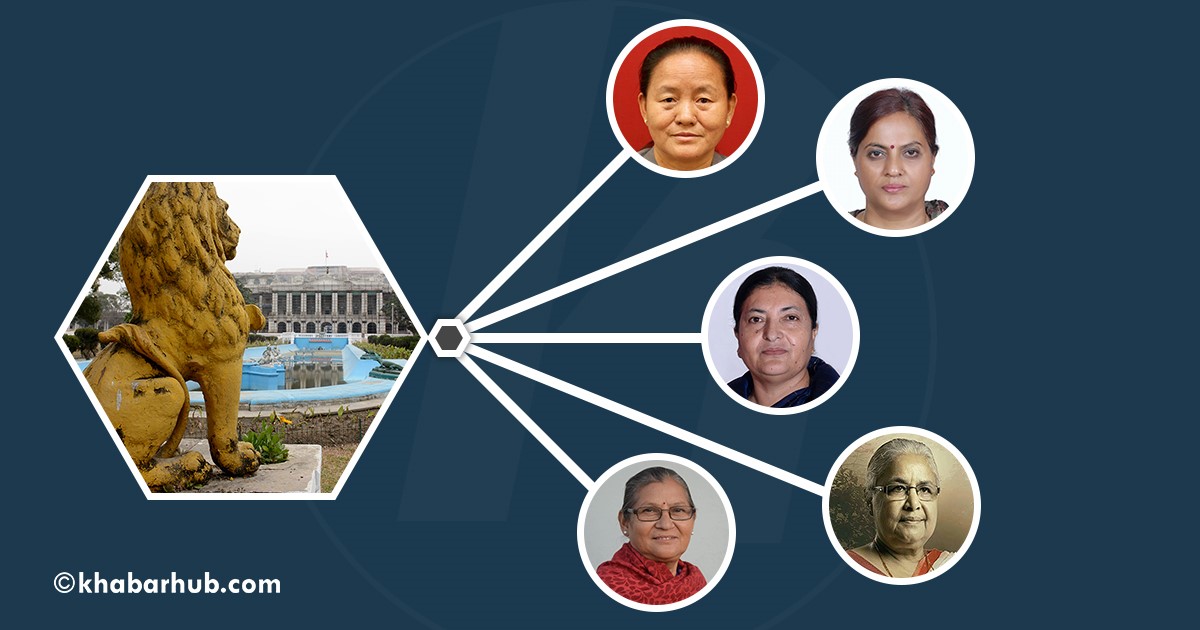KATHMANDU: Tendering her resignation from the post of the Deputy Speaker of the House of Representative (HoR) Dr Shiva Maya Tumbahamphe made a declaration on January 20 that even though patriarchy defeated her, but could not destroy her.
Tumbahamphe had made her interest in the post of Speaker at House of Representatives as a natural successor when the Speaker’s position was lying vacant.
She asked the contemporary key-men in Nepali politics and her chairmen in the party KP Oli and Pushpa Kamal Dahal Prachanda, “What are the bases for my disqualification for the post of the Speaker?”
Though formally not answered in public, Tumbahamphe’s question is answered through the response and the decisions of the ‘key-men’ of her own party.
Her party claiming the ownership of the constitutional provisions ‘ensuring’ women empowerment, turned deaf ears to her ‘disqualification’ on the basis of gender or her state of being a scapegoat for patriarchal bargaining for the post.
However, Dr Tumbahamphe with her sound academic and professional background and the sacrifice she made for the party agenda for justice and equality is not the only person to be discarded by the male-chauvinistic political and state leadership.
Nepal, once a nation claiming the ideal representation of the women in all level of governance and the nation which once had three constitutional body head with Vidya Bhandari as the Head of the State, Sushila Karki as the Head of Judiciary and Omsari Ghartimagar, Speaker the House of Representative seems in back trail in the issues of empowerment lately.
There is no substantive representation of women in the government, the parliament, the political parties and even key positions in the bureaucracy and constitutional bodies these days.
Bina Magar, at the Ministry of Water Supply and Padma Aryal, at the Ministry of Land Management, Cooperatives and Poverty Alleviation are the only two ministers in 23 member Council of Ministers led by PM Oli.
Tham Maya Thapa’s dismissal from the post of Minister at the Ministry of Women, Children and Senior Citizens, women representation in the cabinet has gone below 9%.
“This is unfortunate for the country that the leadership claiming to be reiterating the empowerment and justice agenda turned so shameless in this case,” Dr. Renu Adhikari, a woman rights activist spoke regretfully. “This is the shameless exposure of the orthodox male-chauvinism our society has failed to throw off.”
“The male hegemony has challenged the constitutional provisions we fought for so long,” Adhikari said.
Not only in the government, even in the lower forums and local level structures of the ruling Nepal Communist Party women’s representation is getting lower.
When the political parties had to ensure a minimum of 33% participation of women, while going in the election, the parties had allocated the constituency they could lose for women. This had resulted in the low representation in the parliament.
9 membered NCP Secretariat has nil representation from the women, whereas Ashtalaxmi Shakya and Pampha Bhusal are the only 2 women in the 45 membered Polit Bureau of NCP. This is only 4.44 percentage.
NCP does not have good record of women’s representation in the central committee as well. Out of 441 central committee members, there are only 72 women. This is only 16.33%. The women’s representation does not fare 22-24% in the district committee of the ruling party.
“We are fighting against the unjust and unfair attitude of the leadership in such cases of disregard of women’s participation.” Said Bimala BK speaking to Khabarhub and added, “Unfortunately our legal battle turned helpless when the election commission registered the parties not meeting the constitutional provisions of women’s participation in the leadership.” HoR member from the ruling party, BK added.
Advocates duo Surendra Bhandari and Indu Tuladhar filed a writ demanding the repeal of the party status of the ruling NCP as it failed to meet the constitutional provisions relating to women’s participation. Their writ of Jun.14, 2018 is still unheard as the final verdict has not come in the writ yet.
Senior Advocate interprets the Election Commission’s violation of constitutional provisions as the impact of political appointment in the constitutional bodies. “ This shows why the political parties strive their best to get their people picked in the constitutional bodies.” Senior Advocate Bhandari said. “ The appointed persons pay the politicians back by deciding on their favor.”
However, Surya Thapa, the deputy head of the NCP’s department of publicity denies the allegations and claims the senior leaders are sincerely working to ensure the proportional and inclusive participation everywhere.
“Neither the former NCP (Maoist) nor the former NCP (UML) had ignored the provisions,” Thapa said, “some technical difficulties arose after the party unification, but the leadership is committed to ensuring proportional and inclusive participation.”
The inclusion and representation status of women is worse in Nepali Congress, the main opposition party in the parliament. Sita Devi Yadav, the treasurer of the party is the only office-bearer among the 6 in the Party.
Nepali Congress Central Committee has a weak status of women representation. There are only 18 women in 85 membered Central Committee of NC. This is hardly 21%. The constitutional provision deems it mandatory to be at least 33%.
Confessing that the incumbent central committee has not met the constitutional provision, Uma Regmi, and MP and chairperson of NC -affiliated Nepal Women Association said, “It’s true some lapses are noticed in ensuring participation in leadership, however, we are committed to fare it better.”
She claimed that NC has already made the necessary amendments in the party constitution so as to meet the mandatory representation of a minimum 33%.
Regmi told Khabarhub that they need not be satisfied with the mandatory 33% representation alone. “Women should get their representation as per the demographic proportion.” She added.
She regards women’s lead very significant to ensure the proportional representation.
“Women should be united and prepared better to establish themselves in the leadership and also to fight against long-rooted patriarchy,” parliamentarian and committed woman leader Regmi said to Khabarhub and added, “We have started in the party now, and in the coming general election, most probably there will be the woman candidate for the party Chairpersonship.”
However, Nirmala Dhakal, a sociologist does not agree with the women leaders claim that patriarchy is playing the lead these days as well. “There is a vast difference in society and its structure 30 years before and now.”
Dhakal thinks the leaders making a clarion against the ghost of patriarchy has underestimated the role played by Vidya Devi Bhandari, Onsari Ghartimagar and Sushila Karki as Head of the State, former Speaker and former Chief Justice respectively.
Sociologist Dhakal doubts the intent of those making a loud cry claiming patriarchal domination just citing Dr. Tumbahamphe’s case and says, “It’s the hypocrisy of the women leaders, in fact, they rush to the same leadership requesting favor in most of the occasions.”
Ashta Laxmi Shakya a senior leader of NCP affirmed Dhakal’s claim and recalled how the same women leaders had kept a mum when she tried to establish her claim for the Chief Minister of Bagmati Province.“Women should change their mentality and should trust each other as well.” Shakya said.
Women’s participation is at the poor status in civil service as well. Among 90000 civil servants, only 18-20% are women.
Despite various liberal provisions made lately the women’s participation is still low there.
According to the statistics at the Ministry of Federal Affairs and General Administration, women representation in the gazetted category, women’s participation is hardly 8.64%. No woman has reached the key post of Chief Secretary so far.
Among 69 Secretaries in Civil Service, only 3 are women. This is only 4.34%.
The federal ministry’s record shows that out of 3348 under-secretaries only 258 or 7.70% are women. Similarly out of 10296 section officers only 1597 are women. This is 15.51% only.
These facts reveal the status of women representation in civil service as well.
“Without enough ground, just because she was a woman Binda Hada was refrained from the opportunity of being the chief secretary. She became the victim of a political conspiracy.” Renu Adhikari, a woman rights activist recalled the story of past injustice and added, “ Parbati Thapa Magar was also deprived of the chance of being promoted to IGP.”
Although quite dissatisfied with the status of women representation in other sectors, Adhikari is optimistic about the future of civil service. “ As reservation has reached only 13 years, it’s not much good to criticize civil service saying no woman reached at the high position yet.” he said to Khabarhub, “however, it’s very important to ensure that no conspiracy is hatched to prevent their promotion.”









Comment